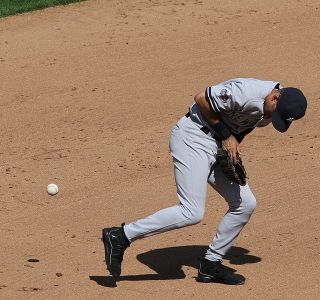Sport and Competition
Overcoming Sports Failures
Achieve optimal performance despite mistakes by staying in the moment.
Posted July 31, 2023 Reviewed by Jessica Schrader
Key points
- Failure in sports is inevitable.
- Dwelling on failure with blaming, anger, or brooding disrupts in-the-moment presence and optimal performance.
- Acceptance and commitment training (ACT) is the trending approach to sport psychology.

“I really think a champion is defined not by their wins, but how they can recover when they fall.”
That observation was by Serena Williams, a tennis icon who knows a little something about being a champion, winning, and recovering from “falls” (mistakes, defeats, and other sport-related disappointments and mental challenges).
Failed performance is as central to the sports experience as uniforms, fans, and coaches. It goes with the territory and, therefore, requires participants to develop the skills necessary to “recover when they fall (fail).” It should be as big a part of the training process as stretching, physical conditioning, and practice. Participants unable to handle sports failure, and unwilling to do something about it, might want to find something else to do outside athletics.
The inability to recover from failure results in continued disrupted performance due to mental distractions—the thoughts and emotions that can show up and cloud the athlete’s focus. When that happens, the athlete is no longer “in the game.”
Whether successful or failed, the game will move on, with or without you. Do you want to be on the train or standing on the side of the tracks as it passes you by?
Observations of the Current Sports Scene
Having been involved in sports in a variety of roles—athlete (amateur), coach, and sport psychologist—for over 50 years, I've detected a change in the past few years in how participants handle losing, mistakes, and other sports failings.
Everything from fans blowing a fuse over questionable officiating calls, parents exploding when their kid makes a mistake, and amateur athletes (kids and adults) hanging their heads, pouting, throwing equipment, and yelling at teammates when things go bad litter the sports landscape.
While such antics have always been around, the frequency and intensity of such behavior has amplified exponentially in recent years. A day doesn’t go by without someone calling my sport psychology practice about their youth athlete(s) struggling with failure or their own sports frustration. It’s unprecedented.
Why is this happening? People appear to be ill-equipped to handle the frustration and disappointment of failure. Upbringing is surely a contributing factor. Many parents shield their offspring from challenging situations and/or rush in to fix whatever problem the child is facing, thus robbing youth of opportunities to exercise and flex their resilience muscles.
A full exploration of why this phenomenon is occurring would require pages and pages of discussion and is not the purpose of this post. The focus is to present an approach to allow athletes to live effectively with failure, enabling them to thrive in sports and other endeavors when things go wrong
Let’s explore.
Cutting Edge Sport Psychology
Acceptance and commitment training (ACT), based on contextual behavioral science (CBS) is a rapidly emerging approach to sport psychology (see How ACT Is Revolutionizing Sport Psychology) and can be highly effective in teaching athletes to recover from failure. A basic premise of ACT is that we have limited control over our circumstances—in this case, failure—and the distracting thoughts and emotions that can accompany them.
The ability to live with those circumstances, thoughts, and emotions in a manner that allows for optimal performance is called “psychological flexibility,” a skill that allows for effectiveness in athletics and all other life activities and challenges.
How to achieve psychological flexibility? By leaving distracting thoughts and emotions alone. Athletes are not likely to feel good or think great thoughts after something bad happens. While those thoughts and emotions can be unpleasant, they can’t hurt a person, unless they dwell, try to change, or ignore them, which usually results in focusing on the inside stuff instead of their performance and the task at hand.
Instead of focusing on what’s going on in between-the-ear distractions, focus on the task at hand. Get out of your head and into the game.
Effective athletes do that all the time via their five senses and proper breathing that keeps disruptive emotions in check. They get present with their eyes, ears, sense of touch, smell, taste, and slow-rhythmic breathing. It starts with awareness that they have become distracted by inside stuff, the thoughts and emotions that can get in the way of optimal performance.
Through that awareness, a baseball pitcher will step off the mound after giving up a home run. They will rub up the ball with their hands (touch), stare off into the distance at a specific spot (sight), chew their gum or tobacco (taste), and breathe deeply.
A hockey goalie will slowly skate around in front of the net after relinquishing a goal. They will clean up the ice with their skates (touch), take a sip of water (taste), and breathe slowly and deeply, before getting back into position for resumed play.
Basketball players prepare for free throws with a visible routine that usually includes deep breaths, stretches, a few dribbles, and eyes on the target before shooting. Getting fouled when trying to score can be frustrating. By staying focused on the task at hand with their senses, they prevent emotion from disrupting their free throws.
The Most Important Moment of Competition
The most important moment of sports competition (and everything else in life) is right now. All the past moments and plays are over and done. There’s nothing you can do to change them. You can yell, scream, throw equipment, etc., and it won’t change what happened. It will also distract the athlete and teammates from what’s happening in the competition right now.
Move on to the present moment.
Athletes must stay focused on the task at hand with whatever necessary senses are needed—eyes, ears, touch, and proprioception (the sense of bodily movement. Stop distracting yourself and teammates with blaming, finger-pointing, temper tantrums, and head-hanging brooding.
Coaches need to train their athletes to stick with what they are doing by modelling a move-on approach when things go wrong. No angry yelling, screaming, or lecturing during a game. None of those long, torturous post-loss lectures and rants that athletes hate and that distract them from moving on to the next game.
The most important thing parents can do when something goes wrong is to keep their emotions in check and being silent. A closed mouth gathers no foot. Keeping your cool sets a good example for everyone involved. If mom or dad needs to say something, encourage participants to move forward. No coaching, blaming, or other distracting behaviors.
Stay Focused on the Right Thing
Failure is guaranteed to happen when participating in sport. Frustration and its accompanying thoughts will show up. Be ready for all that inside stuff that can distract and know what to do when it hits. Frustration, anger, and disappointment won’t distract unless you let it.
Get out of your head and get into the game.




